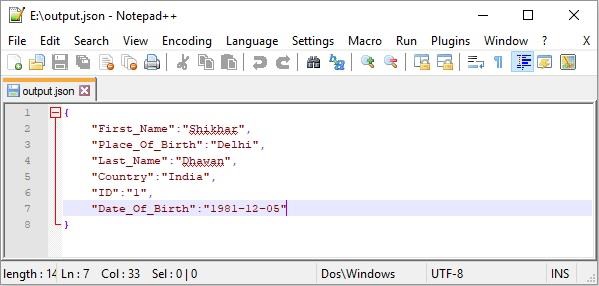
 Data Structure
Data Structure Networking
Networking RDBMS
RDBMS Operating System
Operating System Java
Java MS Excel
MS Excel iOS
iOS HTML
HTML CSS
CSS Android
Android Python
Python C Programming
C Programming C++
C++ C#
C# MongoDB
MongoDB MySQL
MySQL Javascript
Javascript PHP
PHP
- Selected Reading
- UPSC IAS Exams Notes
- Developer's Best Practices
- Questions and Answers
- Effective Resume Writing
- HR Interview Questions
- Computer Glossary
- Who is Who
How to Write/create a JSON file using Java?
In this article, we will learn to write/create a JSON file using Java. JSON has become the standard for data exchange for any kind of application. Java also has a collection of libraries helpful in creating and storing JSON files.
JSON
JSON or JavaScript Object Notation is a lightweight text-based open standard designed for human-readable data interchange. Conventions used by JSON are known to programmers, which include C, C++, Java, Python, Perl, etc.
Sample JSON document
Below is an example of a JSON file:
{
"book": [
{
"id": "01",
"language": "Java",
"edition": "third",
"author": "Herbert Schildt"
},
{
"id": "07",
"language": "C++",
"edition": "second",
"author": "E.Balagurusamy"
}
]
}
Different Approaches
The following are the different Libraries for writing/creating a JSON file in Java:
Using the JSON-simple library
The JSON-simple is a light weight library which is used to process JSON objects. Using this you can read or, write the contents of a JSON document using a Java program.
JSON-Simple maven dependency
The following is the Maven dependency for the JSON-simple library:
<dependencies>
<dependency>
<groupId>com.googlecode.json-simple</groupId>
<artifactId>json-simple</artifactId>
<version>1.1.1</version>
</dependency>
</dependencies>
Paste this within the <dependencies> </dependencies> tag at the end of your "pom.xml" file. (before </project> tag)
Using the Jackson Library
Jackson is a fast library for working with JSON in Java. It's good for big or complex projects that need speed and powerful features.
The Following is the Jackson dependency for reading/parsing a JSON array:
<dependency>
<groupId>com.fasterxml.jackson.core</groupId>
<artifactId>jackson-databind</artifactId>
<version>2.15.2</version>
</dependency>
Using the Gson Library
Gson is a JSON library from Google. It's easy to use and works well for small projects where simplicity matters more than speed.
The Following is the Gson dependency for reading/parsing a JSON array:
<dependency>
<groupId>com.google.code.gson</groupId>
<artifactId>gson</artifactId>
<version>2.10.1</version>
</dependency>
Writing/Creating a JSON file
To create a JSON document using a Java program, the following are the steps:
Instantiate the JSONObject class of the JSON-Simple library.
JSONObject jsonObject = new JSONObject();
Insert the required key-value pairs using the put() method of the JSONObject class.
jsonObject.put("key", "value");
Write the created JSON object into a file using the FileWriter class as:
FileWriter file = new FileWriter("E:/output.json");
file.write(jsonObject.toJSONString());
file.close();
Example
Below is an example of a Java program that creates a JSON object and writes it into a file named output.json.
import java.io.FileWriter;
import java.io.IOException;
import org.json.simple.JSONObject;
public class CreatingJSONDocument {
public static void main(String args[]) {
//Creating a JSONObject object
JSONObject jsonObject = new JSONObject();
//Inserting key-value pairs into the json object
jsonObject.put("ID", "1");
jsonObject.put("First_Name", "Shikhar");
jsonObject.put("Last_Name", "Dhawan");
jsonObject.put("Date_Of_Birth", "1981-12-05");
jsonObject.put("Place_Of_Birth", "Delhi");
jsonObject.put("Country", "India");
try {
FileWriter file = new FileWriter("E:/output.json");
file.write(jsonObject.toJSONString());
file.close();
} catch (IOException e) {
// TODO Auto-generated catch block
e.printStackTrace();
}
System.out.println("JSON file created: "+jsonObject);
}
}
Output
JSON file created: {
"First_Name":"Shikhar",
"Place_Of_Birth":"Delhi",
"Last_Name":"Dhawan",
"Country":"India",
"ID":"1",
"Date_Of_Birth":
"1981-12-05"}
If you observe the contents of the JSON file, you can see the created data as ?


